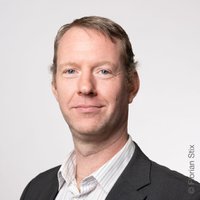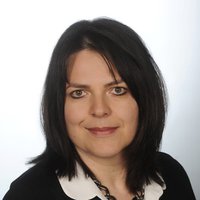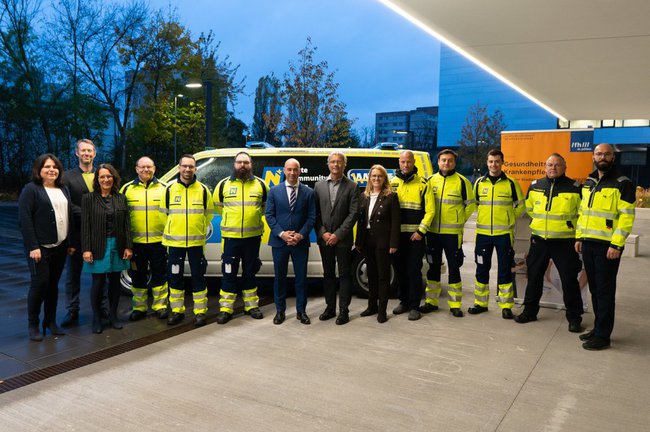Acute Community Nurses in Action
Graduates of the Continuing Education Programme Preclinical Treatment and Care as Pillars of the Healthcare Sector
Due to the demographic development of the population and the lack of general practitioners and highly qualified persons for nursing care at home, the number of rescue operations and ambulance transports is on the rise. Many of these are based on chronic or acute nursing problems that could be solved on location if the care situation was improved.
Pilot Project as Problem-Solver
“To remedy these problems, Notruf NÖ launched a pilot project in May 2020 that involves so-called ‘Acute Community Nurses’ (ACN) – qualified nurses with additional emergency paramedic training – and is financed through NÖGUS”, says Provincial Councillor Christoph Luisser, chairman of the Lower Austrian healthcare and social fund (NÖGUS).
If the emergency medicine or nursing query via 144, 141, or the telephone health advice hotline 1450 indicates that the situation might be solved on site through a nursing intervention or that the emergency forces can be supported, an ACN is dispatched. “We have reached stage 2 of our project by now, which means that ACNs are already stationed in five locations in Lower Austria. Further locations (up to ten) will be added soon, the next one in Haag in the Mostviertel region”, adds Luisser with a look to the future.
Combined Training at the St. Pölten UAS
In 2015, the St. Pölten University of Applied Sciences launched a combinable bachelor degree programme called Healthcare and NursingPLUS into which emergency medical technician and emergency paramedic training can be integrated. The programme is funded through the NÖGUS and cooperates with the NÖ Landesgesundheitsagentur.
“The advantage of the combined training is obvious: Due to their sound knowledge of both emergency and nursing operations, these experts can improve extra-clinical care for patients in their own homes and across disciplines. After obtaining relevant clinical experience, our graduates have another specialist nursing career option as Acute Community Nurses (ACNs) open to them”, says UAS lecturer Stefan Rottensteiner, head of the continuing education programme Preclinical Treatment and Care.
For career changers from the nursing sector with a background in emergency service, the activity as ACN offers a new perspective as well. “By now, seven of the 38 active ACNs – or almost 20 percent – are graduates of this combined continuing education programme. These nursing specialists, who have completed the highest possible training in non-physician emergency service on top of their education, are presently active at the five currently available locations”, explains Notruf NÖ CEO Josef Schmoll.
Relief for Patients and Hospitals
Provincial Councillor for Health Ulrike Königsberger-Ludwig is happy with the project’s progress thus far: “As an addition to the rescue chain, these Acute Community Nurses save the patients from having to travel unnecessarily long distances to hospitals, which is a relief for clinics and staff as well, provides support to rescue teams, and increases their availability for emergencies. A big thank you to Notruf NÖ for this initiative, to the St. Pölten UAS for offering such a specific training in this field, and to everyone who has devoted or will devote themselves to the service of healthcare provision to the Lower Austrian population in project phases 1 and 2. Alongside our hospitals, emergency organisations, physicians, nursing services, etc., they are among those who guarantee more safety for our citizens in terms of health.”
“The commitment of the graduates of our continuing education programme shows that we are offering a training with strong practical relevance here that has the power to considerably improve the provision of healthcare in Lower Austria. Collaborations like the one with Notruf NÖ are an important building block for success in this context”, says UAS CEO Hannes Raffaseder.
Taking Stock
The ACNs were responsible for more than 5,500 interventions between January and October 2023. 40 percent of these were of an acute nursing nature, while 20 percent were combinations of paramedic and nursing measures, roughly ten percent were pure rescue interventions, and five percent were cases of primary care because the district physicians were unavailable on weekends. The rest were other interventions, follow-up visits, re-revaluations via telephone, and cancelled deployments.
“Many of the interventions were for problems with drainages, catheters, or tubes, followed by atraumatic pain, spine and back problems, fever and infections, general weakness and reduced general condition, but more than half of this number was made up by minor injuries, collapse, nausea and vomiting, or diarrhoea and stomach pains”, reports Notruf NÖ CEO Christian Fohringer.
Apply Now!
The application for the study programme Healthcare and Nursing starting in the summer semester 2024 is open until 26 November 2023. Applications for the study programme including the continuing education programme starting in autumn 2024 are accepted until May 2024.

FH-Prof. Stefan Rottensteiner , BSc MA
Lecturer Course Leader Prehospital care and nursing (acad.) Department of Health Sciences
